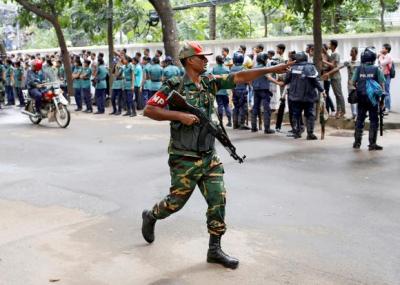Italians 'main target of Dhaka attack'

ROME -- After the terrorist attack in Dhaka that left 28 dead, amongst whom nine Italians, on Saturday, the Italian authorities are demanding clarity in the case and a full investigation into the allegations that their nationals were the main targets of the attack on a multinational café and bakery which ended so brutally after a 12-hour siege.
Whilst this is only the second biggest terrorist attack on Italian citizens, the Bengalese government have confirmed that the attack was carried out by a jihadist group, though deny the possibility that this group is linked to ISIS, despite so-called Islamic State claims of responsability after the event.
“The Italians were the main target,” according to the special forces ROS branch of the Carabinieri, who have expressed their wish to investigate further. The café, Holey, was reportedly very much in fashion and frequented by Italians, leading the Italian Foreign Office to hypothesise that, “it’s certain that they were targeting foreigners, but we’re not far away from saying that our nationals were the targets,” as stated by the Undersecretary of Foreign Affairs Benedetto della Vedova.
The Italians have also been quick to criticise the length of time it took Bengalese forces to act whilst the hostages were being held, saying that they should have acted with force sooner in order to not give the kidnappers so much time to kill hostages.
Speaking to Sky on Sunday afternoon, however, Italian Prime Minister Matteo Renzi wished to stop rumours that Rome was frustrated with Dhaka for not having wanted to share their investigations. “It was a command unit who were ready to do anything,” he said, continuing, “We followed each moment live. I believe that we had all the necessary information for the reconstruction, which can often be false anyway. They entered the location to kill.”
Those who carried out the attack in Dhaka, it has emerged, were all young men from wealthy families therefore it is certain that more money will be invested into the intelligence sector to prevent such an occurrence happening again.
The bodies of the nine victims are due to be repatriated on Wednesday, where Italian President Sergio Mattarella will be there to meet them and pay his respects, after cutting his visit to Latin America short to fly back to Italy.
The ROS investigation will also confirm or negate one of the current theories that the Italians were allegedly targeted due to their exploitation of Bengalese workers in clothing ‘sweat shops’. Whilst the median wage is 70 to 100 dollars a month, fabric and clothing production makes up 30 percent of the GDP of the country.
According to Shafiur Rahman, a Bengalese worker who travels back and forth between London and Dhaka, Gulshan, the area in which the attacks occurred, “is one of the richest neighbourhoods in the city.” She added, “It’s the neighbourhood for foreigners and from textile businessmen, especially Europeans. Also Italians. It’s the place to target if you want to hit the government, if you want to wound the state and their economic motor.”
Rahman has said that ISIS has frequently expressed the opinion that the Bengalese government is one of criminals and must be punished. “The only way to do that was to attack the main Bengalese business: that is to say, attacking the foreigners so that investors will stop coming. They know that Bangladesh is still too independent on external companies, with their free zone and the increase of investment banks.”
ch


